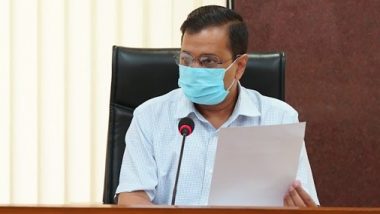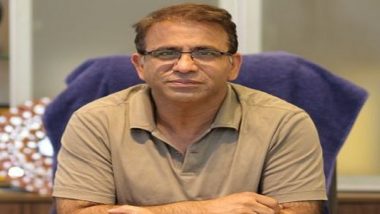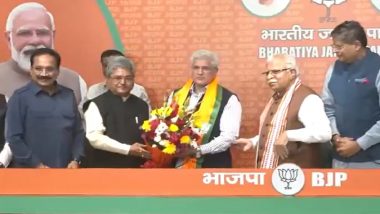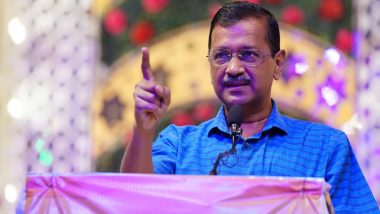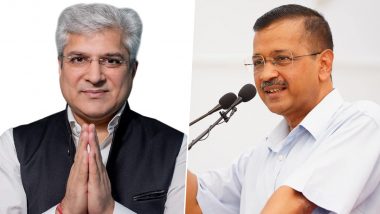New Delhi, October 7: Delhi Chief Minister Arvind Kejriwal on Wednesday convened a meeting with the delegation of the National Restaurant Association of India (NRAI), several Ministers and top officials of various departments and agencies and directed them to remove hassles in the ease of doing business for the restaurant industry in Delhi. In the meeting, various decisions were taken for the economic revival of the hospitality industry in the national capital.
"Delhi's restaurants are the pride of Delhi and provide employment to lakhs of people. I have directed all the respective departments to remove unnecessary hassles in the smooth running of restaurants in Delhi," said CM Arvind Kejriwal after today's meeting. The meeting was attended by several cabinet ministers including Deputy CM, Chief Secretary, MCD commissioners, and top officials of various departments. A detailed representation was received from the NRAI, to provide relief and ease regulations and permit raj constraining the growth of the restaurant industry in Delhi. Delhi Govt Allows Restaurants to Operate 24x7, Tourism Licence Not Required.
Various measures to ensure the introduction of licensing reforms in the restaurant industry in Delhi were taken in today's meetings, under various departments such as MCD, Delhi Police Licensing Department, Tourism License, Excise Reforms, Shops & Establishments, Delhi Fire Service, Delhi Pollution Control Committee, etc.
Riyaaz Amlani, a restaurateur and an NRAI member, said, "Restaurants are one of the key sectors for employment generation in the city with lakhs of people employed in this industry in Delhi. It is currently one of the most over-regulated industries that requires multiple NOCs and duplication of licenses. All the members of the NRAI and restaurateurs are glad that the meeting was held by CM on a positive note, and I hope that a lot of duplication will get resolved. The restaurant industry is one of the most impacted industries in Delhi. These measures will provide the necessary measures and the boost that we need, and unleash the employment potential. By deregulating the industry, more restaurants will open up which will generate more employment and help the tourism industry. A lot of the most visited cities in the world are known for their nightlife and restaurants."
The CM also instructed that the health trade licenses, which are issued by the Municipal Corporations to the restaurant industries should be abolished within 10 days. Putting forward their cause of concern, the restaurateurs had said that the FSSAI , a body operating under Govt of India, already ensures the issuing of food and safety hygiene licenses, and the issuing of health trade licenses by the local bodies has made the task duplicated and irrelevant. The CM reviewed the letter written by the FSSAI addressing the Municipal Corporations to cease the further issuing of licenses and directed the officials to do the same.
The NRAI delegation requested the abolishment of the police licenses since restaurants are a part of the retail sector and no other retail establishment is required to obtain a police license. The CM ensured that a decision to provide relief to the restaurants from police licenses will soon be taken after discussing concerned stakeholders. In addition, a decision was also taken to completely do away with licenses from the Tourism industry to open or run a restaurant.
A number of reforms and amendments in the Excise policy and rules were also discussed and agreed to at today's meeting, in lieu of many archaic provisions in the existing regulatory framework governing the restaurant industry. In the meeting, the Excise department agreed to review the existing policy of a 10 % automatic increase in the license fees every year. Deputy CM and Finance Minister, Manish Sisodia, directed for the restaurants to be able to pay their excise by 31st March from the existing deadline of 28th February, and for them to make quarterly license fee payments without any interest. It was decided that other relevant suggestions related to amendments in Excise regulations will be considered to be included in a new policy currently under preparation, permitting the extension of the operating timings of the restaurants on the weekends till 3 am etc.
Decisions were also taken in today's meeting to immediately amend archaic Excise rules so as to permit service in open areas, balconies, verandahs, etc. without any additional fee, to permit additional dispensing counters in the licensed premises without any additional fees, to permit branding within the licensed premises, to permit licenses for all types of music, including DJs, Live Bands, and Karaoke, to abolish the requirement of a designated liquor store and to allow the stock to be kept anywhere in the licensed premises.
On the request of restaurateurs to allow 24x7 business, it was agreed that the restaurants will be allowed to operate at all hours subject to the condition that they submit an undertaking that they will take care of the health and security of their entire staff. This will help the industry generate more employment in the national capital through higher demand. This will set an example for the Delhi Model of ease of doing business.
On the request of simplifying fire norms for restaurants situated in old and heritage sites such as CP, Khan Market etc., it was decided that a technical committee would be constituted which in 10 days will examine ways to enhance fire safety in such locations, without the need to make structural changes to the existing restaurants. Based on the recommendations of the committee, the CM will decide on the application of uniform fire safety norms in Delhi.
The DPCC had earlier exempted restaurants with less than 100 seats from the need to mandatorily install Effluent Treatment Plants (ETPs). The Central Pollution Control Board (CPCB) had however issued recent guidelines requiring the installation of ETP for restaurants consisting more than 36 seats.
Given the extreme space constraints in and around many small restaurants, it was agreed at the meeting that DPCC will write to the CPCB with a request to revert back to the earlier decision by DPCC exempting the requirement for a dedicated Effluent Treatment Plant (ETP) for restaurants below 100 seating capacity. It was also decided that the DPCC will issue a clarification to the MCDs on permissibility of Wood charcoal in the grills and tandoors of the restaurants and to ensure that harassment of the restaurants be stopped on this front.
Further, after discussions with officials from Weights and Measures department, it was decided that the restaurants will be exempted from the requirement of stamping and verification of weighing scales in case they are being used in the restaurants for internal purposes since it is not a consumer-facing activity.












 Quickly
Quickly









